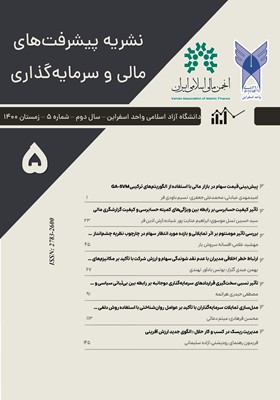بررسی تاثیر مومنتوم بر اثر تمایلاتی و بازده مورد انتظار سهام در چارچوب نظریه چشمانداز و حسابداری ذهنی
محورهای موضوعی : سرمایهگذاریمهشید علامی 1 , افسانه سروش یار 2 *
1 - گروه حسابداری، واحد اصفهان (خوراسگان)، دانشگاه آزاد اسلامی، ، اصفهان، ایران
2 - گروه حسابداری، واحد اصفهان (خوراسگان)، دانشگاه آزاد اسلامی، ، اصفهان، ایران
کلید واژه: حسابداری ذهنی, مومنتوم, نظریه چشمانداز, اثر تمایلاتی, بازده مورد انتظار سهام,
چکیده مقاله :
هدف این پژوهش بررسی تأثیر مومنتوم بر اثر تمایلاتی و بازده مورد انتظار سهام در چارچوب نظریه چشمانداز کانمن و تورسکی (1979) و حسابداری ذهنی تالر (1985) است. در این پژوهش جهت محاسبه اثر تمایلاتی از چارچوب گرینبلات و هان (2005) استفاده شده است. جامعه آماری پژوهش شامل کلیه شرکتهای پذیرفته شده در بورس اوراق بهادار تهران بین سالهای 1386 تا 1398 میباشد که با استفاده از روش حذف سیستماتیک، 102 شرکت بهعنوان نمونه انتخاب شده است. برای آزمون فرضیههای پژوهش از روش رگرسیون چندمتغیره استفاده شده است. نتایج پژوهش نشان میدهد که مومنتوم بر اثر تمایلاتی تأثیر دارد. نتیجه دیگر پژوهش حاکی از این است که اثر تمایلاتی بر بازده مورد انتظار سهام دارای تأثیر معنیداری است. همچنین پس از کنترل اثر تمایلاتی سهام، تأثیر مومنتوم بر بازده مورد انتظار سهام، تضعیف میشود. به عبارت دیگر، ضرایب مومنتوم کوتاهمدت، میانمدت و بلندمدت در شرایطی که اثر تمایلاتی کنترل میشود کمتر است و این بدین معناست که با کنترل اثر تمایلاتی سهام، تأثیر مومنتوم بر بازده مورد انتظار سهام، کاهش مییابد.
The purpose of this study was to investigate the effect of momentum on the disposition effect and expected stock returns in the framework of the prospect theory of Kahneman and Tversky (1979) and the mental accounting theory of Thaler (1985). The statistical population of this research included all companies incorporated in Tehran Stock Exchange between 2008 and 2019 from which102 companies were selected as the sample using the systematic elimination method. Multiple regressions were used to test the hypotheses of the research. The results of testing the research hypotheses indicated that momentum influenced the disposition effect. Another result showed that momentum affects the expected stock returns. Moreover, after controlling the disposition effect, the impact of momentum on the expected stock returns was reduced. In other words, the short-term, medium-term and long-term momentum coefficients are lower when the disposition effect is controlled, which means that by controlling the inclination effect of stocks, the momentum effect on the expected stock decreases
Shumway, T., & Wu, G. (2006). Does Disposition Drive Momentum? Papers.ssrn.com.
Thaler, R. (1985). Mental Accounting and Consumer Choice. Marketing Science, 4(3), 177–266.
_||_

